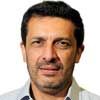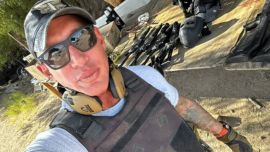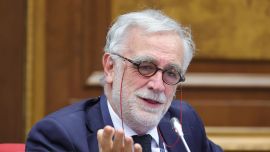This time there was no way Hugo Sigman could escape the media spotlight. 'Pandemic,’ ‘coronavirus’ and ‘vaccine’ form a trilogy naturally drawing the cameras to any protagonist combining those three words. Above all the last, vaccine – the cure for that disease still awaiting a definitive solution.
On August 13, Argentina announced that the pharmaceutical company AstraZeneca had sealed an agreement with biotech firm mAbxience to transfer technology for the initial production of 150 million doses of the active substance for a potential vaccine against Covid-19. The latter company is Argentine and belongs to Grupo Insud, headed by Hugo Sigman. But this businessman, apart from being one of the 10 richest people in Argentina, is directly involved in other projects without making the headlines – projects of mass consumption, some of them successful both at home and abroad.
Such is the case of Sigman’s participation as a film producer. In 2005, with Oscar Kramer, Sigman officially co-founded K&S Films, even if the duo had already participated in a first film in 2004 – El perro, by Carlos Sorín. This film was followed by 15 others whose casts included, among others, stars such as Ricardo Darín, Guillermo Francella, Lali Espósito, Rodrigo de la Serna, Diego Peretti and Mercedes Morán – in films such as La odisea de los giles, Séptimo, La Cordillera, Acusada, El ángel and Relatos salvajes or the Spanish Truman and Mientras dure la guerra (Alejandro Amenábar) as well as El Pepe, the Emir Kusturica documentary about and starring Pepe Mujica. Many of these films have led to Sigman walking up red carpets alongside the casts or directors at festivals like Cannes and Venice.
It was in the latter city that another facet of Hugo Sigman was on full display. In 2015, on the occasion of the famous Biennale art show, he accompanied the Argentine committee at the national pavilion exhibiting La rebelión de las formas, with the works of the artist Juan Carlos Distéfano, of which he has one of the biggest collections. But, of course, not just of his pictures. In fact, there is an important art collection on the premises of one of his companies in the heart of Barrio Norte.
Beyond the art world, Sigman can also be linked to former Spanish prime minister Felipe González, with whom he maintains a friendship and whom he hosted on several of his recent visits to Argentina. Grupo Insud is also one of the main sponsors of the Di Tella University’s annual dinners gathering funds for scholarships.
A doctor and psychiatrist, Sigman graduated in medicine from the University of Buenos Aires and in psychiatry in 1969. His involvement in business activities had already commenced in the 1970s when he was living in Barcelona. His wife, Silvia Gold, accompanies him in all enterprises and she also manages a foundation financing the conservation of flora and (above all) fauna in the Paraná watershed. In Corrientes they also have a hotel where they combine recreation with conservation.
In 1977, prompted by his father-in-law, he founded a company dedicated to the development, production and marketing of medicine, which is currently present in over 40 countries. After various decades in the pharma business, he decided in 2010 to create the Grupo Insud of companies dedicated to pharmaceutical production, naming himself CEO and overseeing an expansion into other areas – hotels, publishing, media, garments, forestry, agriculture and, of course, cinema.
Sigman has three sons, Leandro, Mariano (the best-known) and Lucas, who also keeps a low profile.
Hopes pinned on science
At the Olivos presidential residence on August 13, the agreement between the AstraZeneca pharmaceutical company and the biotech firm mAbxience of Grupo Insud for the initial production of 150 million doses of the active substance for the potential vaccine against Covid-19 was announced.
The Latin American production will be entrusted to Argentina and Mexico with the intention of supplying not this country but also other Latin American nations (with the exception of Brazil) as from the first half of 2021. For that it will first need to successfully pass Phase III studies ahead of regulatory approval.
In a radio interview with Marcelo Longobardi soon after the announcement, Sigman explained: “If the vaccine is not approved, it will have to be destroyed (...) AstraZeneca approached us in the understanding that ours was the best factory.”
























Comments